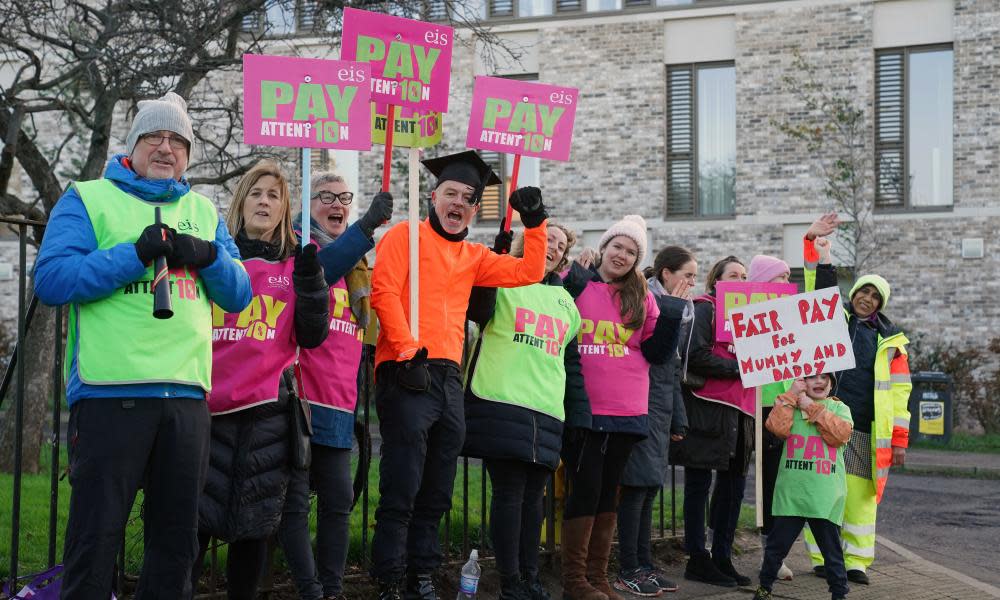Schools close across Scotland as teachers go on strike over pay

Virtually all schools in Scotland have closed their doors to pupils as teachers took part in their first national strike for almost 40 years after dismissing the latest pay offer as an “insult”.
Just a few primary schools in Orkney and Shetland opened as normal on Thursday, while elsewhere children remained at home as thousands of members of the Educational Institute of Scotland (EIS) took part in a one-day strike.
The EIS represents 80% of Scotland’s teachers and Thursday’s industrial action affected almost all primary, secondary and additional support needs schools, as well as many nurseries and early years learning centres.
The union said there were picket lines across Scotland with regional pay campaign rallies planned in Glasgow, Edinburgh, Aberdeen, Inverness and Elgin during the afternoon.
Teachers voted overwhelmingly for strike action after they rejected a 5% pay offer in a ballot more than three months ago. The EIS, meanwhile, described a last-minute offer put forward this week by employers as “cynical”, increasing the average value of the offer from 5% to just 5.07%.
“Their much self-lauded ‘generous and progressive’ offer is actually worth, on average, an extra 71 pence per week to Scotland’s teachers compared to the previously rejected offer,” said EIS’s general secretary, Andrea Bradley.
“We really did not want to be in this position, and have engaged constructively in talks for many months, but have been forced into this strike by the inaction of the Scottish government and Cosla (the Convention of Scottish Local Authorities) who have refused to make any improvement to a pay offer that was roundly rejected by teachers three months ago.”
The education secretary, Shirley-Anne Somerville, said the latest offer – the fourth that has gone to unions – would have meant a 21.8% cumulative increase in teacher pay since 2018 and a starting salary for a fully qualified teacher of £35,600 – £7,650 more than counterparts in England.
“It is simply unaffordable to have a 10% increase which unions are asking for within the fixed budget which the Scottish government is working in,” Somerville added.
“I recognise the strength of feeling within the unions but they also need to recognise that the Scottish government budget is fixed and is already committed. Any new money for teacher pay would have to come from elsewhere in education.”
Under the latest rejected pay offer from Cosla, some teachers earning less than £40,107 would receive an extra £1,926 a year, equivalent to a 6.86% uplift for the lowest paid, while those in the top two bands were being offered a 5% uplift.
Teachers told BBC Radio’s Good Morning Scotland programme of their anger at the latest pay offer, and described how difficult it had been taking strike action. One teacher, Andrew, who works in Angus, said: “Our main job is to look after and educate young people. We absolutely love doing that but we also want to be paid similar to the rate of inflation.”
Disruption will continue in Scotland with the EIS planning further strike action in the new year, while the Scottish Secondary Teachers’ Association and the NASUWT union are planning to strike on 7 and 8 December, leading to closures of some schools and disrupted timetables in others.
In England, members of the two largest teaching unions, the National Education Union and the NASUWT, are voting to strike after the government failed to improve its 5% pay offer, raising the prospect of schools and colleges closing this winter.
The Association of School and College Leaders has also opened its first consultative ballot, asking members if they support a formal ballot on strike action.

 Yahoo News
Yahoo News 
